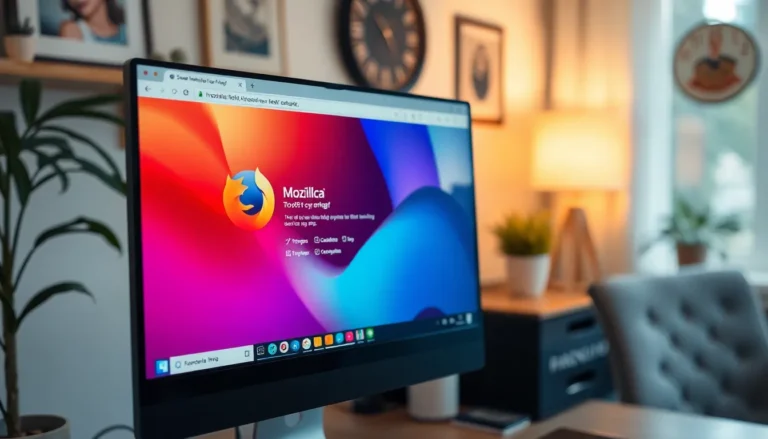Table of Contents
ToggleIn a world where screens are as common as baby bottles, the question of screen time for babies under one has parents scratching their heads. Can a baby really benefit from a little screen time, or is it just a digital babysitter? With adorable giggles and tiny fingers reaching for the nearest tablet, it’s hard to resist the allure of letting technology entertain the little ones.
Understanding Screen Time For Babies Under 1
Screen time for babies under one presents significant concerns. Experts emphasize that infants benefit more from real-world interactions than from digital screens. The American Academy of Pediatrics advises against any screen time for babies in this age group, except for video chatting. These vital early months involve developing crucial skills through human contact, play, and exploration.
Studies reveal that excessive screen exposure may hinder language development. Limited engagement with caregivers can also affect social skills. Infants require opportunities to engage with their environment, fostering cognitive and emotional growth.
Moderation becomes fundamental in this context. Some parents might use screens as a quick distraction. However, substitute engagement methods such as toys, books, and physical play whenever possible. Screen time can represent an easy short-term solution but may lack long-term developmental benefits.
Parents should remain mindful of content quality when screens are involved. Educational shows, when appropriate, can offer some value, but they should not replace active play and parent-child interaction. Establishing a balance helps ensure that infants receive the stimulation they need from their surroundings while minimizing reliance on screens.
Facilitating interactions through reading or singing serves as a more enriching form of engagement. Quality time spent together can foster communication and strengthen bonds. Emphasizing the importance of this developmental stage encourages a better understanding of screen time’s impact on infants.
The American Academy of Pediatrics Guidelines
The American Academy of Pediatrics (AAP) provides clear guidelines regarding screen time for infants. It recommends no screen time for babies under 18 months except for video chatting.
Recommendations for Screen Time
Parents should prioritize face-to-face interactions over screen exposure. Communication helps develop language skills, so engaging with babies directly encourages verbal and non-verbal communication. Limited screen time can also contribute to optimal growth and development. Even when using screens, supervision enhances the experience; caregivers can make the activity interactive by discussing content. Quality content matters, as educational resources support learning, yet should accompany active play.
Importance of Caregiver Interaction
Caregiver interaction forms the foundation of a baby’s social and emotional development. Engaging with caregivers fosters trust and builds strong relationships, which are crucial at this young age. Real-world interactions stimulate cognitive development effectively compared to passive screen time. Activities like reading and singing create memorable experiences that promote language acquisition. Connection through play encourages exploration, which enhances a child’s curiosity and learning. Prioritizing these interactions helps develop essential skills that benefit children long-term.
Potential Benefits of Screen Time
Limited screen time for babies under one can offer specific benefits if approached carefully. Both educational content and family connectivity can play essential roles in a baby’s development.
Educational Content
Well-curated educational content can enhance cognitive skills in young children. Quality programming introduces basic concepts like colors, shapes, and numbers, which can aid in language development. Some shows encourage interactive learning, prompting infants to respond with sounds or gestures. Such engagement can create a foundation for later learning. Parents can select programs that prioritize educational value while ensuring they watch together. This interaction fosters learning and strengthens the parent-child bond through shared experiences.
Promoting Connectivity with Family
Screen time can promote family connections, especially during video chats. Regularly scheduled video calls with grandparents or other family members provide social interaction, which helps build relationships. Visual cues in these conversations enhance emotional understanding and recognition. Frequent video chats create a sense of belonging, allowing infants to connect with loved ones, even from a distance. Engaging together during these calls can transform screen time into a meaningful bonding experience. Encouragement of family interactions through digital platforms supports social skills and emotional development.
Risks Associated with Screen Time
Screen time poses significant risks for infants under one year. Research indicates that excessive exposure can adversely affect cognitive and emotional development.
Impact on Brain Development
Screen time influences brain development in critical ways. Studies show that interactive play promotes neural connections more effectively than passive viewing. The American Academy of Pediatrics emphasizes prioritizing hands-on activities, such as reading and song engagement, which stimulate areas of the brain related to language and social skills. Infants relying on screens for entertainment miss essential sensory experiences that enhance cognitive growth. Observations indicate that face-to-face interactions foster better communication skills, while reliance on screens can limit these interactions.
Sleep Disruption and Attention Issues
Screen time can disrupt sleep patterns for infants. Exposure to screens, especially before bedtime, interferes with the natural sleep cycle, making it challenging for babies to settle down. Researchers observe that blue light emitted from screens can confuse the body’s internal clock, reducing melatonin secretion. Infants experiencing sleep disturbances often show increased irritability and difficulty concentrating during awake periods. Attention problems can arise as early as toddlerhood, leading to behavioral issues. Experts recommend creating a screen-free bedtime routine to promote healthy sleep habits and support overall development.
Recommendations for Parents and Caregivers
Establishing guidelines around screen time for babies under one fosters healthy development. Prioritizing face-to-face interactions enhances language and cognitive skills significantly.
Setting Healthy Boundaries
No screen time for infants under 18 months, except for video chatting, aligns with the American Academy of Pediatrics (AAP) recommendations. Parents and caregivers can limit exposure by creating a schedule that includes device-free periods daily. Ensuring screens remain out of reach during playtime keeps infants engaged with their surroundings. Engaging with physical toys, books, and outdoor activities can replace digital distractions. Caregivers should model appropriate boundaries by minimizing their own screen use during interactions. In doing so, families nurture a more connected environment that encourages exploration and communication.
Alternatives to Screen Time
Numerous alternatives exist for enriching a baby’s developmental experience without screens. Parents can incorporate reading activities, which build vocabulary and understanding of language. Singing songs or simple nursery rhymes strengthens auditory skills while creating bonding moments. Engaging in physical play, like tummy time or a play gym, promotes motor skills and cognitive development. Exploring the outdoors offers sensory experiences that screens cannot replicate. Interactive toys, such as blocks or stacking rings, encourage problem-solving and creativity. By providing these engaging alternatives, caregivers foster a dynamic environment that enhances a child’s growth and learning.
Navigating screen time for babies under one is a complex issue for parents. While the allure of screens can be tempting for quick entertainment, the emphasis should remain on real-world interactions that foster development. Engaging in activities like reading and singing offers invaluable benefits that screens simply can’t replicate.
Parents should be mindful of the American Academy of Pediatrics guidelines, which advocate for no screen time except for video chatting. By prioritizing face-to-face connections and enriching play, caregivers can create a nurturing environment that supports cognitive and emotional growth. Fostering these interactions lays a strong foundation for a child’s future learning and social skills, ensuring they thrive in their formative years.





